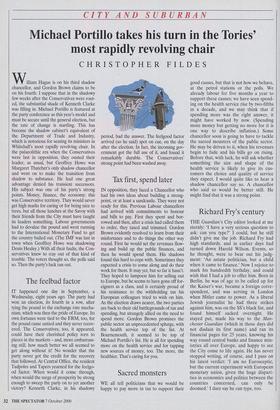CITY AND SUBURBAN
Michael Portillo takes his turn in the Tories' most rapidly revolving chair
CHRISTOPHER FILDES
William Hague is on his third shadow chancellor, and Gordon Brown claims to be on his fourth. I suppose that in the shadowy few weeks after the Conservatives were rout- ed, the substantial shade of Kenneth Clarke was filling in. Michael Portillo is featured at the party conference as this year's model and must be secure until the general election, but the rate of change is startling. This has become the shadow cabinet's equivalent of the Department of Trade and Industry, which is notorious for seating its ministers in Whitehall's most rapidly revolving chair. In the palaeolithic era when the Conservatives were last in opposition, they ousted their leader, as usual, but Geoffrey Howe was Margaret Thatcher's only shadow chancellor and went on to make the transition from shadow to substance. He had one great advantage denied his transient successors. His subject was one of his party's strong points. Money, finance, the economy: this was Conservative territory. They would never get high marks for caring or for being nice to trees, but all those lunches at the Savoy with their friends from the City must have taught its leaders something. Labour governments had to devalue the pound and went running to the International Monetary Fund to get the country bailed out. (The IMF was last in town when Geoffrey Howe was shadowing Denis Healey.) With all their faults, the Con- servatives knew to stay out of that kind of trouble. The voters thought so, the polls said so. Then the party's luck ran out.


















































































 Previous page
Previous page